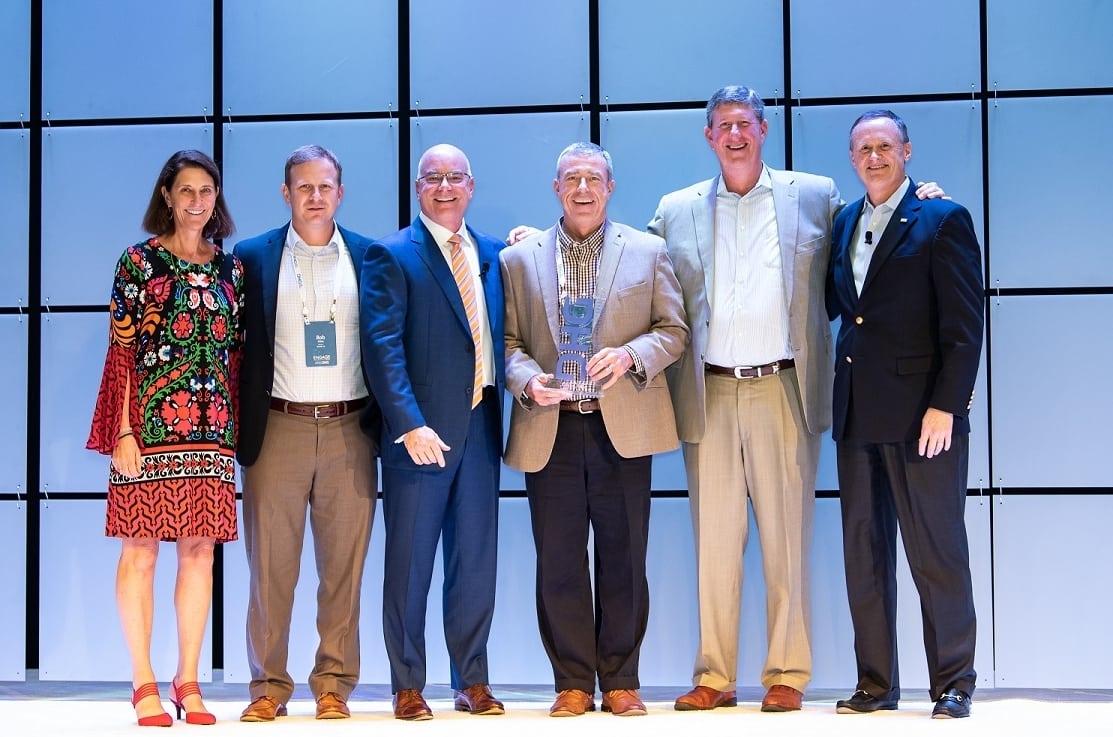Top 7 Accounting Firms with Its Unique Strategy in Winning People
While all accounting and advisory firms are in charge of similar tasks, some are more influential than others, and when determining the top players, there are a few factors considered. Even it reputation in specialty industry when serving high-stakes clients or passion in delivering consistent accuracy and precision, the value of the company is considered the root to tell that company apart.
Let’s take a look at this top 7 with each’s voice telling how it has succeeded by doing differently.
#1 Dixon Hughes Goodman: How Great Client Experience Builds Valuable Work Environment?

Founded in 2004, North Caroline, and generated about $404 million in annual revenue by the end of 2019. DHG talks on its investment on overall client experience area or also called CX. Director of Client Experience, Saari Gardner says it’s great CX helps the company build valuable careers for its people.
The director breaks down that understanding how to deliver an outstanding client experience is fundamental to building a valuable career. Whether your team members are serving on one of client’s engagement teams or working in a non-client-facing role, you have to strive to develop these skills in your people to make them stronger professionals.
When the doctrine of how clients are served align with the doctrine of how employees treat each other within your organization, you are creating the desired conditions for a client-centric culture to thrive. The notion here is that everyone in the company has clients – some being external and some internal. While serving internal clients with excellence, you would be enabled to serve the external better.
When your team serves external clients well, the company is position for growth which translated into more resources for employees to build great careers.
Gradner also stresses on a communication methodology the company has successfully practiced to train and build deeper connections with its employees, called Two-way communicate.
In this process, teams would be informed about what leaders are doing and how it would affect employees personally. In returns, leaders would be given insights into what people are thinking and it helps build their communication skills.
Successful companies are not just communicating out, but more importantly, they are communicating in. “We were able to identify trends, address issues and provide clarification through listening. Having that immediate feedback is a wonderful asset,” Gardner says.
#2 BKD: the Beauty of Coaching

Founded in 1923, BKD is a Missouri-based accounting firm which has been in operation for nearly a century. It is known for staying on top of each account and for knowing the numbers inside out. Last year, the company announced to generate $694 million in revenue with global presence of 2,981 employees. Tom Watson, BKD’s Chief Executive Officer shares the firm’s coaching leadership culture and the challenges he sees.
Watson claims his leadership beliefs as well as the types of leadership and coaching culture he hopes to continue and even improve across all levels at the firm is that the most important job of a leader is to enable those they lead to reach their fullest potential.
“An effective leader sets high expectations for their team and provides the coaching, resources, vision, and perhaps the occasional nudge to help them achieve those expectations,” says Tom.
You have to urges your leaders to use their influence to make those around them better. Your firm leaders should help others excel by sharing their experiences and talent, it can create exponential result that will far exceed what any individual can do alone. And that is the magic of matching leadership and teamwork.
About coaching leadership, it’s about 360-degree feedback provided both management and each individual within the organization. In this case, as coaching leaders you are effective communicators that also experienced in delegation and giving others the opportunity to take on new challenges.
While able to help your people visualize a plan for attainment of specific goals, you also have to be comfortable to let go and take on the role of observe to see how individual thrive when given something different or challenging to do.
“What keep me up at night are people-related issues. How happy and motivated are team members? How focused are they on truly delivering spectacular client service? Do we have a pipeline of truly exceptional professionals who can grow our business and take care of all client needs?”
#3 Baker Tilly: Virchow Culture That Nurture Partnership Structure

Founded in 1931, Chicago Illinois, the firm employs more than 3,500 accounting professionals with 374 partners throughout the globe. Thriving for almost a century the firm has its own secrete sauce in nourishing a partnership culture.
The company’s Chairman Alan Whitman describes how the firm define culture and how is it kept front.
Even though it is not something one can touch, culture can definitely be felt, and it is the foundation of who your company are and the reason for your operation. A strong culture drives an organization while a weak one hold everyone back. Therefore, it should be the first things you consider when exploring potential mergers and the thing you lean on when considering a new hire.
There are many factors that go into shaping culture. But to Whitman it should starts with your core values because that would be what you expect and how you believe in each other. Those values would inspire your team actions, gauge how you do your business. And as a culture it is shorthand for what your company stand for and what you stand against.
Whitman also addresses how growth infuses your culture. Remember companies should only grow to get better – not just bigger. Upon that, growth should create opportunity for your people and clients. A culture of growth – not just growth itself – is more of a mindset that is shared by everyone in your firm, especially client-facing role and support roles.
The challenging part is not only in establishing but also in maintaining your culture, especially after mergers and in leading partnership.
Had made many grand mergers in its life, BKD’s Chairman says a mixture of separate subcultures is not how it wins. Even though some values would be stress bolder than others in different markets, there is an overriding set of cultural norms across the organization that all of its people stand by including stewardship, integrity, and passion.
And ‘consensus,’ when it comes to leading in a partnership structure. The minutes your partners stop feeling like partners – but rather a subordinate, you have a problem. So, it’s crucial that people around the boardroom or management committee table feel they carry a package that as large as you and have a meaningful say without being criticized for any opinions.
#4 Crowe: Wins by ‘Trusting’

Founded in 1942, Indiana, American member of the firm generated over $933 million in 2020 and its CEO Jim Powers says it’s ‘trust’ that motivates the firm people to produce such succession wins.
“I’m a firm believer that people are more motivated and productive when you trust them to do what you’ve hired them to do,” says Powers. He suggests leaders embrace teams by let them do it their own way, rather than focus your energy on an outdated dress code or making people travel to office, try to concentrate on measuring what matters and allowing your professions to deliver the best possible client experience. In that case, if you people are engaged and productive, it’s an even bigger win for your clients.
With this mentality, the company is reinforcing a new policy where personnel do not have to be located near a physical office. The firm aims to be a destination for next generation of talent.
“Younger people have grown up doing homework online, working on tablets, holding meetings in coffee shops and fielding job interviews via conference call, so these moves just make sense,” said Julia Wood, Crowe Chief People Officer. The firm says, this strategy means you are relaxed, but it shouldn’t mean unengaged. The key for success is open and continuous communication between team members and managers.
Any strategies or culture model requires strong leadership, as a seasoned leader Powers portrays his experience “I don’t think one kind of leadership can capably handle every situation.” Certain leadership styles are more suited to handling certain types of situations, depending on the sector and the organization. If you look at different CEOs and business leaders, their positions are not based solely on tenure. You have to find the right fit between the leader and the organization.
Powers believes one characteristic that every leader should possess is how good they are able to bring talented people together and get them engaged, excited and motivated about heading in a certain direction. Getting people aligned with you as opposed to being coerced is an important characteristic of leadership today.
#5 CohnReznick: to Be a Mentor You Have to Be Coachable
“Never take anything for granted, sometimes you rise up in an organization and you do not realize the impact that you can have on people. Make sure that every single day you are giving quality time to those people and that you are listening to them. Leaders must mentor the next generation because they are our future” – Frank Longobardi – former CohnReznick CEO

Founded in 1919, CohnReznick is based in New York. The firm says it’s how it deals with conflict that helps win people across the organization.
Upon this, the company CEO Frank Longobardi recalls how he have heard many leaders over the years say they need better people, but he often disagrees. To him, what leaders need is a better culture that brings the best out of people they already have – a great culture then will nurture the greatness in people, which in turn will draw more great people.
And the core value of that culture at CohnReznick, he says, comes from authentic relationships. Just be authentic with people, you may not see the result right away, but it would soon pay off.
Companies should evaluate what they are doing. While outside coaches provide the tools, you should provide employees with the heart. Too often corporations become unconsciously competent at what they do and forget the important things that work for the long haul – is your human capital.
Remember what you have with people are much more important than any kind of survey, but this is not easy under the burden of unresolved conflict. To nurture healthy and authentic relationships leaders are suggested to protect their time – because as you are not distracted you would take real time to connect with your people and reach into relationships to listen and serve in an authentic way.
Besides, within the context of your own character you must always ask if yourself is coachable? Am I receptive to positive and negative feedback? Am I willing to listen to a mentor?
“The minutes we are not coachable we lose ground as a mentor,” says Longobardi.
There’s a lot of people who want to mentor and a lot of people who don’t want to mentor. Don’t give up, keep looking for them, and keep nurturing them. You don’t get this stuff out of a book. You get it from living it every day at home and at work. You get it from coaching and mentoring and being coached and mentored.
#6 CliftonLarsonAllen: Success in Keeping the Best People

Founded in 1960, Minneapolis, Minnesota, the firm was formed in 2012 from a merger of LarsonAllen and Clifton Gunderson firms. The company is known for how well it keeps the best people around, especially with Jen Leary the CLA’s Managing Partners and CEO talks on the firm’s secret sauce for employee retention.
Losing your best people damages your productivity, disrupts current and potential leadership, reduces team morale and also helps your competitors. Leary suggests avoiding such dilemma your retention strategy should include the following traits.
First, Track retention using data and exit interview result. Because unless you track retention, you cannot improve it. With data, you are allowed to know where problems exist in order to pinpoint with more accuracy.
Second, hire the right personnel. Seek out people who are intrinsically motivated and interested in developing their skills and careers. Remember to clearly establish expectations when you hire so that disappointments on both sides can be avoided. It’s also important to evaluate candidates for a cultural fir so that potential hires assimilate well into your company culture and teams.
Last, efficiently train first level managers. To Leary, employees hardly quit on the company, they rather quit on their managers. As leaders, you have to make sure managers can communicate sufficiently, offer feedback and behave professionally – that are crucial part of your retention strategy.
“Competition makes us all better. So, train you people so they are in the highest demand, but treat them so well that they do not want to go,” – Jen Leary, CliftonLarsonAllen
This is how Leary describes her ideal leadership style. Strengths of good listening and communication skills as well as the ability to be a caring leader in the crowded corporate world. “I found that these skills have helped me reach the level of engagement to move individual, an organization forward.”
#7 MossAdams: Turns Your Feature into Benefit

Moss Adams has been in operation since 1913, headquartered in Seattle Washington. With more than 3,200 employees, the company serves many sectors, but says its specialties are in life science and healthcare. In recent years, the firm earns spots on the Working Mother 100 Best Companies list, the NAFE Top Companies for Executive Woman list.
These movements somehow have not only benefited the firm but also the clients it serves, says Jen Wyne, Director of Human Resources at Moss Adams. As clients everywhere are getting more and more diverse, they want to work with a firm that shares the same values. So, this strategy toward Woman movement has helped the firm set different perspectives and background which later deliver a better client experience. It also serves as a differentiator for the firm company amongst the market.
It called Forum W which has been around for over 10 years now, to help the firm attracts, develops, retains and advances talented women. Over the years, this forum has successfully surveyed women professionals to understand what is important to them. And Wyne says, there are some insights into how the firm leverage its data.
As any other firms in the industry, the firm hired as many women as men, however, they had not advanced to partner at the same rate as men. And because women are a significant segment of your talent base, fail to cultivate their careers means lost in investment in that talent – and disruption to client service. There as organization and employers, your responsibility is to not only exploit but also cultivate in your talent resource.
When Forum W began, the firm started measured success by generating interested and participation, and in engaging women in meaningful dialogue about their skills, their goals, and their experiences at the firm. 10 years later, the movement somehow is the voice of the firm and a differentiator for attracting clients and people to the firm.
Building on those lessons, Wyne says, any organizations should have their own attraction and patiently remain laser-focused on it, try to broaden your attention on cultural impact by taking intentional steps to foster an environment where employees can thrive. That is the genesis of any movement and attraction.
Wyne also mentions employee engagement survey could be a great strategy to identify where you need to focus your efforts. It could range from providing more support for mentoring to wanting more opportunities for feedback on their performances. Take those data and incorporate it into your strategy!
Business Is about People
Regardless of industry, make sure your business is all about honoring people and relationships, between employees, managers, and especially clients. Even though leaders understand this concept intellectually, executing turns out not as easy as it seems.
And as successful organization says great leadership shapes great employees, each has it owns way developing and wining people. It’s that differentiator make each prevails in a unique way.









